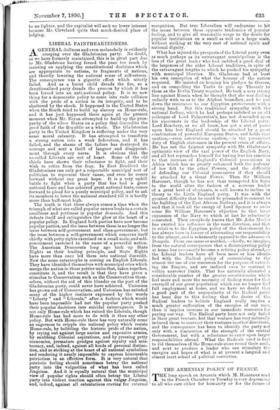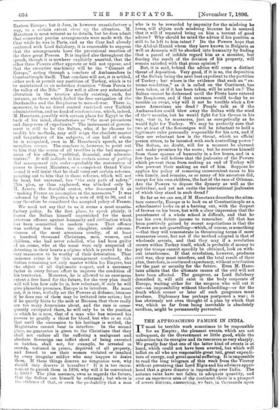THE ARMENIAN POLICY OF FRANCE.
THE long speech on Armenia which M. Ha.notaux read to the French Chamber on Tuesday is very depressing to all who care either for humanity or for the future of Eastern Europe; but it does, in however unsatisfactory a way, to a certain extent clear up the situation. M. Hanotaux is most reticent as to details, but he does admit that somewhat precise arrangements were made with the Czar while he was in Paris, and as the Czar had already conferred with Lord Salisbury, it is reasonable to suppose that the arrangements have the provisional sanction of the three great Powers. It is implied also throughout the speech, though it is nowhere explicitly asserted, that the other three Powers either approve or will not oppose, and that the executive machinery will be the "Concert of Europe," acting through a conclave of Ambassadors in Constantinople itself. That conclave will not, it is settled, either seek or permit any partition of Turkey, which is to be maintained as an unbroken dominion "from Persia to the valley of the Nile." Nor will it allow any substantial alteration in the treaties already existing, such, for instance, as these which forbid the free navigation of the Dardanelles and the Bosphorus to men-of-war. There is, moreover, to be no direct control exercised over Turkish administration, and no kind of condominium, which, indeed, M. Hanotaux, possibly with certain plans for Egypt in the back of his mind, characterises as "the most precarious and dangerous of expedients." The instrument of govern- ment is still to be the Sultan, who, if he chooses to modify his methods, may still reign the absolute master and taxgatherer of his subjects, of one half of whom he is recognised, even in M. Hanotaux's speech, as the merciless enemy. The conclave is, however, to point out to him that the source of all troubles is the bad manage- ment of his affairs, "political, financial, and adminis- trative." It will indicate to him certain means of putting that management into order—probably the restoration of power to decent Ministers, or a competent Grand Vizier —and it will insist that he shall carry out certain reforms, pointing out to him that in those reforms, which will not be local, but universal, lies "the only path of safety." This plan, as thus explained, was attacked only by M. Jaurits, the Socialist orator, who denounced it as " making France an accomplice in the,massacres." It was ,,ndorsed by the Deputies by a vote of 402 to 90, and it may therefore be considered the accepted policy of France.
We need not say that to us it seems a most unsatis- factory policy. In the first place, to speak plainly, it leaves the Sultan himself unpunished for the most grievous offence against humanity and civilisation which has been committed in modern times. That offence was nothing less than the slaughter, under circum- stances of the most atrocious cruelty, of at least a hundred thousand Christians, men, women, and children, who had never rebelled, who had been guilty of no crime, who at the worst were only suspected of detesting in their hearts a rtginie which is proved by the very massacres to be worthy of their detestation. That immense crime is by this arrangement condoned, the Sultan remaining not only master within his Empire, but the object of all diplomatic respect, and a necessary factor in every future effort to improve the condition of his territories. Moreover, he is allowed to an enormous extent a free hand for the future, for the very plan itself will tell him how safe he is, how reluctant, if only he will give plausible promises, Europe is to interfere. He must not, it is true, verbally set the Powers at defiance, because if he does one of them may be irritated into action ; but if he quietly hints to the mob at Broussa that there really are too many Armenians about, and the race is conse- quently extirpated there, he will only be in the position in which he is now, that of a, man who has misused his powers to gratify a thirst for blood, but who is so rich that until the succession to his heritage is settled, the Magistrates cannot bear to interfere. In the second place, no guarantee is given to the Christians that they shall not endure all the suffering a malignant and absolute Sovereign can inflict short of being executed in batches, shall not, for example, be arrested in crowds, tortured in prison, deprived of all property, and forced to see their women violated or insulted by every irregular soldier who may happen to desire them. If these things deserve no vengeance now, why should they deserve it hereafter ? It it is too incon- venient to punish them in 1896, why will it be convenient in 1900? The plan assumes, even as regards the future, that the Sultan can himself be reformed ; but where is the evidence of that, or even the probability that a man who is to be rewarded by impunity for the misdoing he loves, will abjure such misdoing because he is assured that it will if repeated bring on him a torrent of good advice ? Why should he mind the advice if his position is still to be left to him intact ? Do the Powers hope that the Abd-ul-Hamid whom they have known in Bulgaria as well as Armenia will be shocked into humanity by finding that a parcel of infidels regard him as a monster, but fearing the result of the division of his property, will remain satisfied with that pious opinion ?
But, it is said, behind the advice will come a distinct threat of deposition. Very good, if it is so, the deposition of the Sultan being the next best expedient to the partition of Turkey ; but where is the evidence that such an " ex- treme resolution," as it is called on the Continent, has been taken, or if it has been taken, will be acted on ? The Sultan cannot be dethroned until the Fleets have entered the Bosphorus, and if that entrance would to-day be so terrible an event, why will it not be terrible when a few more Armenians are dead ? People talk as if the Ambassadors could blow away the Sultan with the wind of their mouths, but he would fight for his throne in his way, that is, by massacres, just as energetically as he would fight for Turkey. We may be perfectly sure that two at least of the Sovereigns will be reluctant to hold a legitimate ruler personally responsible for his acts, and if they are reluctant how is the threat, which no official person utters, to be invested with such controlling power ? The Sultan, no doubt, will for a moment be alarmed and make promises by the score; but he recovers himself from those spasms of humanity in a few hours, and in a few days he will believe that the jealousies of the Powers which prevent them from making an end of Turkey will also prevent their making an end of him. Suppose he applies his policy of removing inconvenient races to his own family, and remains, as so many of his ancestors did, except for his own children, the last of the race of Othmau. Are the Powers to depose the dynasty as well as the individual, and yet not excite the international jealousies of which they stand in such dread ?
So far as we an see, if M Hanotaux describes the situa- tion correctly, Europe is to look on at Constantinople as a schoolmaster looks on at a barring out, with the deepest of frowns on his brow, but with a, clear impression that the punishment of a whole school is difficult, and that he has his own future income to remember. All that has been positively gained by recent negotiations is that the Powers are not quarrelling—which, of course, is something —that they will remonstrate in threatening terms if more massacres occur, but not if the method adopted is that of wholesale arrests, and that they may if a revolution occurs within Turkey itself, which is probable if money to pay the troops cannot speedily be obtained, look on with- out interference. If that revolution, however, produces civil war, they must interfere, and the total result of their plan, therefore, is continued expectancy, without retribution for the past or security for the future. Even M. Hano- taux admits that the ultimate causes of the evil will not have been affected. The gangrene, as Lord Salisbury described it, will still exist in the body corporate of Europe, waiting either for the surgeon who will cut it out—an impossibility without bloodshedding—or for the death which sooner or later all such gangrenes must produce. Diplomacy has perhaps postponed a war ; it has obviously not even thought of a plan by which that war, which so far from being inevitable is absolutely needless, might be permanently prevented.



















































 Previous page
Previous page